
![]()
![]()
Do-It-Yourself information for the modifications I've completed
![]()
Do-It-Yourself information for essential wear and tear items
![]()
Articles covering all the ways to maintain your car
![]()
All about the BMW 330ci
![]()
Various links that I've found valuable
![]()
A few pictures of my car and some others
Changing Your Tie Rods
Warning!
The information provided at "Bmw330ci.net" web site is "as is" with all faults and without warranty of any kind, expressed or implied, including those of merchantability and fitness for a particular purpose, or arising from a course of dealing, usage or trade practice. "Bmw330ci.net" web site nor it's owner/creator, can not and does not provide any warranty, expressed or implied, about the accuracy or use of information found on "Bmw330ci.net" web site. The user assumes that risk.
THE USE OF THIS INFORMATION IS FOR YOUR REFERENCE ONLY. BMW330CI.NET AND ITS OWNER/CREATOR DISCLAIM ALL LIABILITY FOR DIRECT, INDIRECT, INCIDENTAL, OR CONSEQUENTIAL DAMAGES OR INJURIES THAT RESULT FROM ANY USE OF THE EXAMPLES, INSTRUCTIONS OR OTHER INFORMATION ON THIS PAGE.
Difficulty
Changing out your tie rods is similar to changing your control arms but a bit easier. Once again the hardest part is simply seperating the ball joints. However once it's done, the rest of the job is easy! This took me about 2 hours simply because I was taking my time. Now the reason why I had to replace my tie rods is because the dealership (where I took it in for an alignment) said my tie rods were siezed. I was at 100k so I just decided to go ahead and replace them. Now my entire front end should be good for another 100k.
Tools Needed
Torque Wrenches
Screwdriver
Needle Nosed Pliers
Various Sockets and Wrenches
34mm Crows Foot (Pipe wrench could work if you don't want to buy a some more tools. I also enjoy the opportunity to buy some new tools)
5mm Allen Wrench
Penetrating Oil (This will help do some of the work for you like PB Blast)
Pickle Fork (Can be rented from your local auto parts store for free)
Rubber Mallet and a Sledge Hammer (I used a 10lb to get the job done quickly)
Hack saw or dremel with metal cutting attachment
Parts Needed
Lemfoerder Tie Rod Assembly With Hardware Left (Part # 32-11-1-096-897) $75
Lemfoerder Tie Rod Assembly With Hardware Right (Part # 32-21-1-096-898)
$75
Anti-Sieze Compound (To make the job easier next time)
Zip Ties (One long and one medium)
Instructions
Safely lift at least the front of the car
1. Using a lift or a floor jack with ramps lift at least the front of the vehicle. Instructions for jacking up your car can be found here. This can be a very dangerous step, so make sure that the car is properly secured before ever getting under it. Never get under a car that is just supported by a jack!
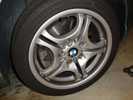 Remove the front wheel 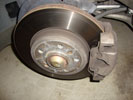 Remove the front wheel |
Remove the front wheels |
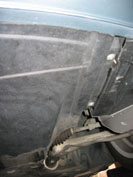 Remove the splash shield 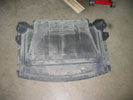 The splash shield |
Remove the splash shield |
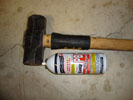 Tools needed to seperate the ball joint 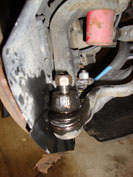 Spay some penetrating oil and loosen the nut 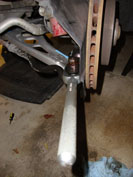 Seperate the ball joint 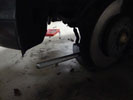 Get the proper angle |
Seperate the ball joint from the steering knuckle |
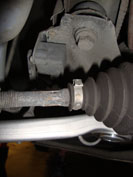 Remove band on the tie rod 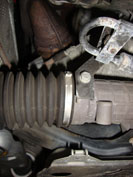 Remove the band on the steering rack |
Remove the bands from the dust boot |
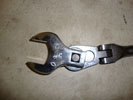 Attach the 34mm cros foot to a breaker bar 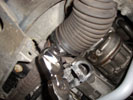 Loosen the 34mm nut holding the inner tie rod on 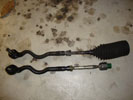 Old versus new tie rod |
Remove the inner tie rod from the steering rack |
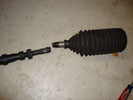 Cut the old tie rod in half to re-use the old dust boot 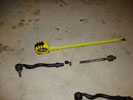 Make sure you measure the tie rod before cutting (not as pictured of course) 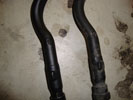 The tie rods are marked for a particular side, follow suit |
Measure the old tie rod, cut it, and remove the old dust boot |
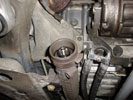 Attach the 34mm cros foot to a breaker bar  Loosen the 34mm nut holding the inner tie rod on 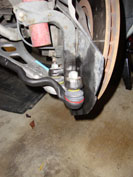 Old versus new tie rod |
Install the new tie rod |
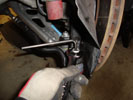 Tighten the locking nut onto the ball joint 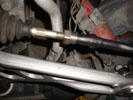 Tighten the tie rod adustment nut 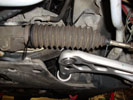 Use zip ties to reattach the dust boot |
Tighten everything down |
Put everything else back together |
Conclusions
After getting my alignment done, I can definitly tell that the steering is much more responsive and bumps don't affect the steering neerly as much. It feels like a brand new car again and if you're nearing 100k, I'd highly recommend changing things out. The only reason I changed mine was the old ones were "siezed" and even though they probably could be "un-siezed" with 100k on the ball joints, it was probably time to change them anyways. One less thing to worry about now.
Disclaimer
All product manufacturer logos are property of their respective manufacturer.